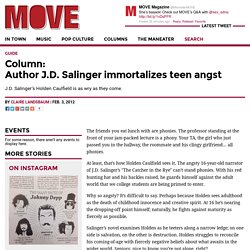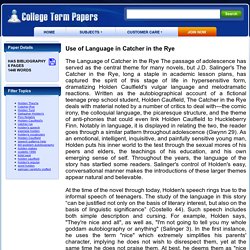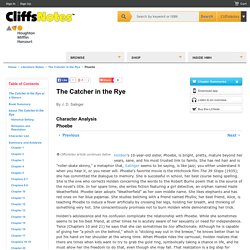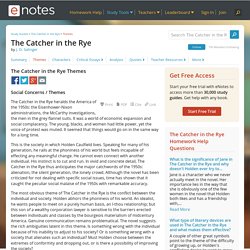

Catcher In The Rye, ebook, by J D Salinger. The Catcher in the Rye Study Guide. Author J.D. Salinger immortalizes teen angst – MOVE Magazine. Guide Column: Author J.D.

Salinger immortalizes teen angst J.D. Salinger’s Holden Caulfield is as wry as they come. Events For some reason, there aren't any events to display here. More stories The friends you eat lunch with are phonies. At least, that’s how Holden Caulfield sees it. Why so angsty? Salinger’s novel examines Holden as he teeters along a narrow ledge; on one side is salvation, on the other is destruction. "The Catcher in the Rye" spans exactly three days and 224 pages, but that tiny timeframe contains Holden’s personal journey of self-discovery — a series of moments in which he pinpoints his issues with adulthood and moves beyond them.
The journey begins (as cliché as it sounds) at school. What this means is never exactly spelled out. The shield is up constantly. Holden isolates himself from the “phonies” because he thinks himself superior to them, never realizing he’s a bit of a phony himself. Use of Language in Catcher in the Rye, English - CollegeTermPapers.com. The Language of Catcher in the Rye The passage of adolescence has served as the central theme for many novels, but J.D.

Salinger's The Catcher in the Rye, long a staple in academic lesson plans, has captured the spirit of this stage of life in hypersensitive form, dramatizing Holden Caulfield's vulgar language and melodramatic reactions. Written as the autobiographical account of a fictional teenage prep school student, Holden Caulfield, The Catcher in the Rye deals with material noted by a number of critics to deal with—the comic irony, the colloquial language, the picaresque structure, and the theme of anti-phonies that could even link Holden Caulfield to Huckleberry Finn.
Notably in language, it is displayed in relating the two, the reader goes through a similar pattern throughout adolescence (Gwynn 29). Phoebe. Holden's 10-year-old sister, Phoebe, is bright, pretty, mature beyond her years, sane, and his most trusted link to family.

She has red hair and is "roller-skate skinny," a metaphor that, Salinger seems to be saying, is like jazz; you either understand it when you hear it, or you never will. Phoebe's favorite movie is the Hitchcock film The 39 Steps (1935); she has committed the dialogue to memory. She is successful in school, her best course being spelling. The Catcher in the Rye Themes. Hatred of Phonies "Phonies" is arguably the word most often associated with J.

D. Salinger's The Catcher in the Rye. Ducks, Fish, and Other Wildlife in The Catcher in the Rye. Holden just can’t let up about those ducks.

He asks his first cab driver if he “happen[s] to know where they go, the ducks, when it gets all frozen over? Do you happen to know, by any chance? " (9.4); and throws same question at a second cab drive a few chapters later (12.8). In his big breakdown moment, he stumbles drunkenly around the park looking to see “what the hell the ducks were doing, see if they were around or not” (20.38). Once he finally finds the lagoon, they’re not there—so he sits down and thinks about suicide. Yeah, we think the ducks are probably important. Holden has experienced a lot of death on a personal level, but he’s also standing in for the way post-war America was dealing with the losses of World War II. Notes on The Catcher in the Rye Themes. Chapter 1 Lies and Imagination 1: Holden, in his wish to "feel some kind of good-by" (pg. 16) before he leaves Pencey, shows himself to be concerned with the authenticity of his own feelings.

He wants to use his imagination to feel more connected to the world and to his own emotions. Chapter 3 Lies and Imagination 2: Holden's inability to stay enrolled in school isn't a result of a lack of imagination--he's a fan of good books and seems interested in learning from them. It's almost as if he has too much imagination for school. Chapter 5 Lies and Imagination 3: The report Holden writes for Stradlater about his brother Allie's baseball mitt, shows that Holden has a poetic imagination. Chapter 14 Lies and Imagination 4: A big part of Holden's trouble with movies is that they pollute peoples' imaginations. Chapter 18 Lies and Imagination 5: Holden's imagination isn't used just in the service of fantasies and escapism.
Chapter 20 Chapter 22 Chapter 25 Lies and Imagination 8: It is unclear if Mr. Does Catcher In The Rye Brainwash People?